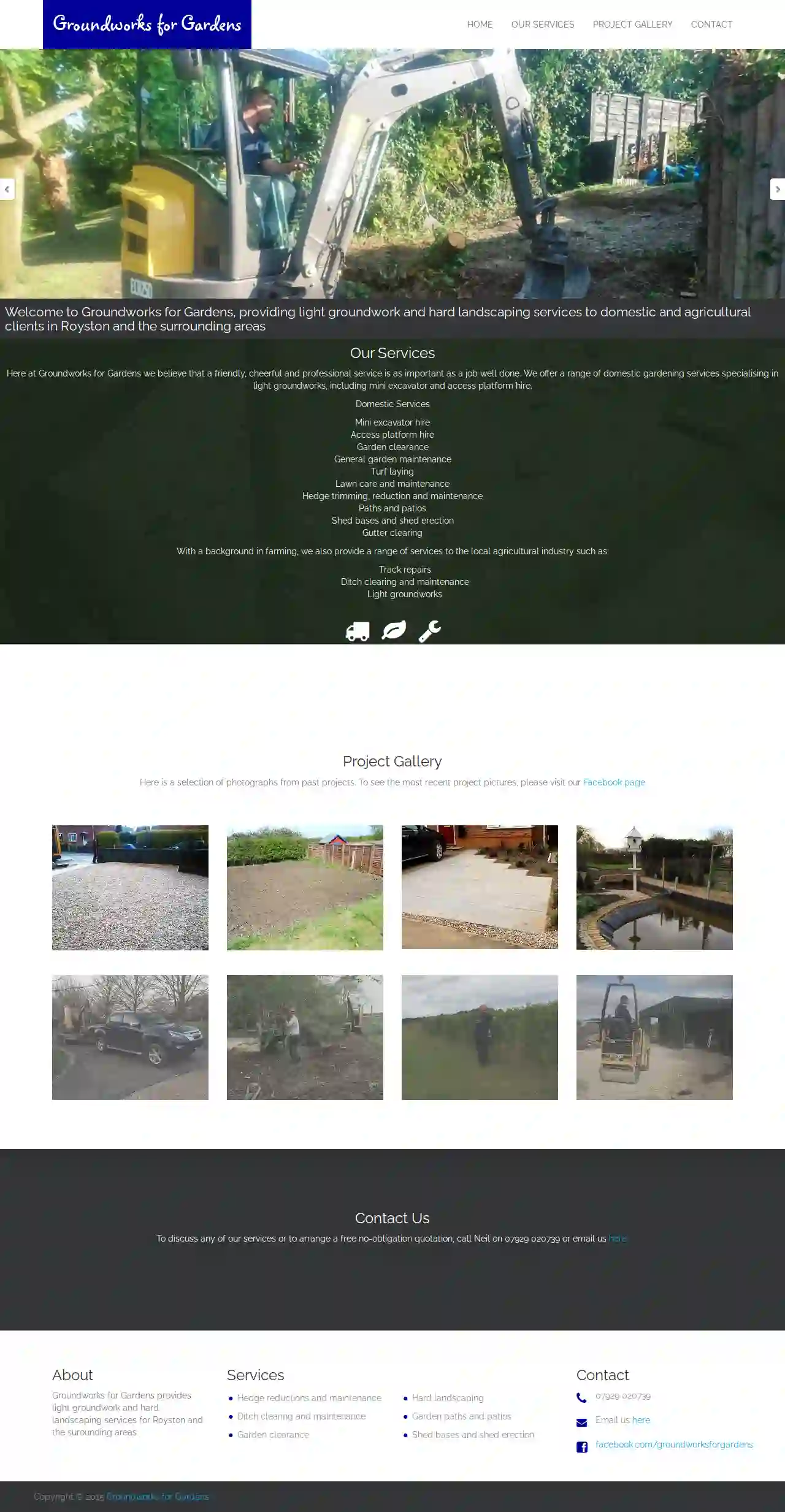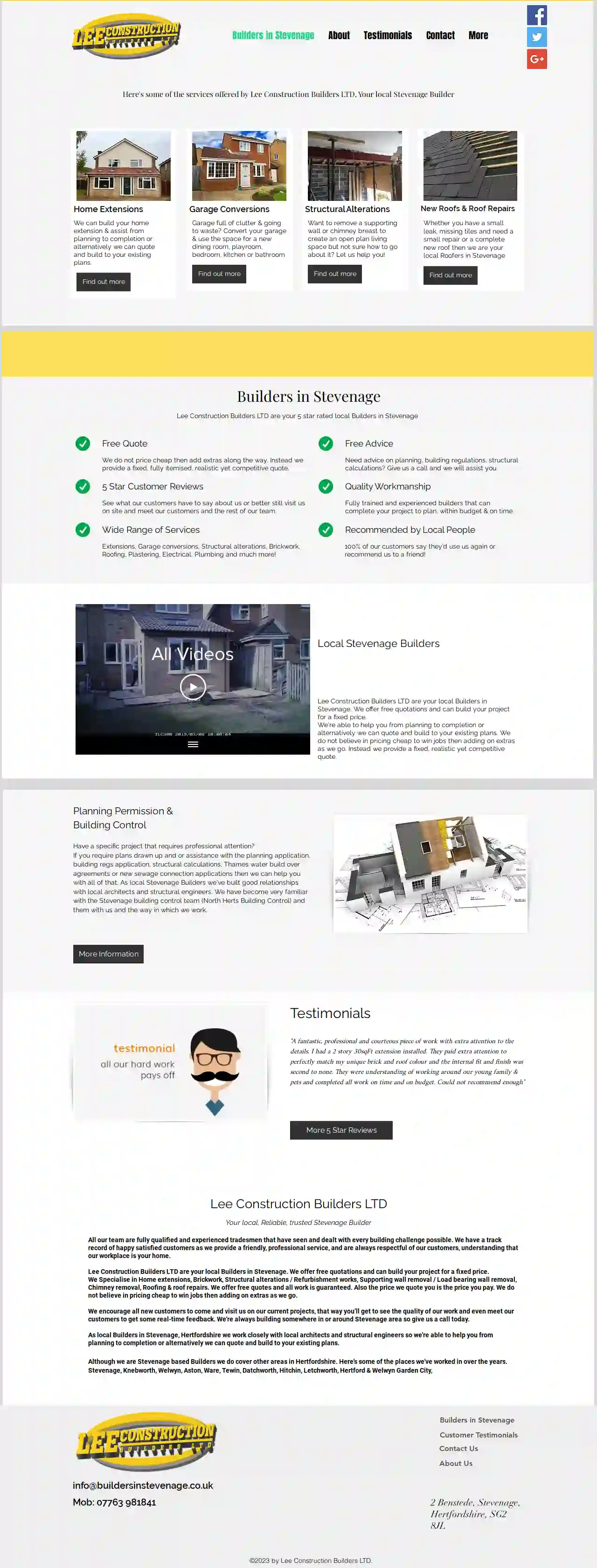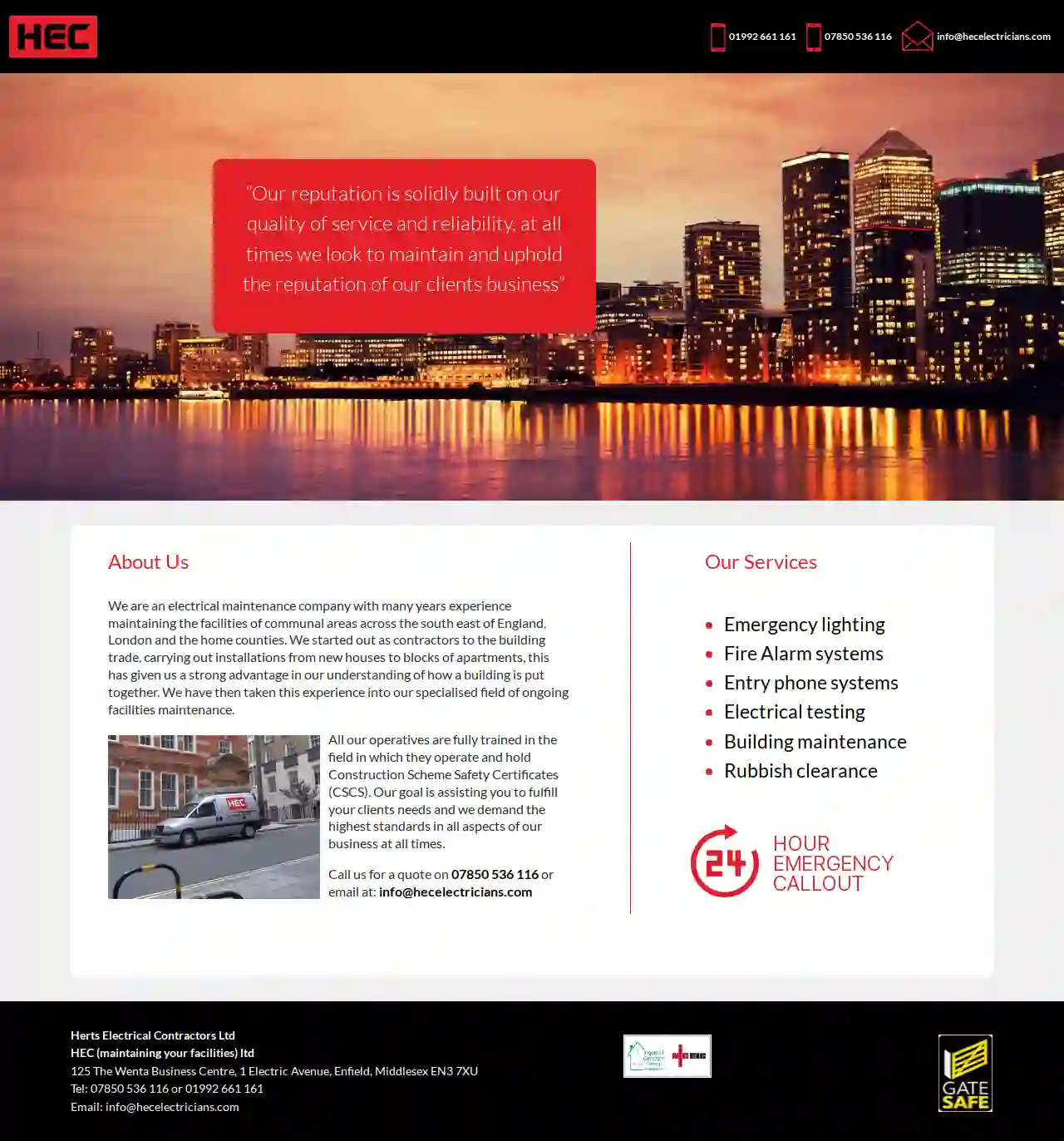Excavation Contractors Park Street
Find Excavation Contractors in Park Street
Get up to 3 Excavating Contractors quotes for your project today! Compare profiles, reviews, accreditations, portfolio, etc... and choose the best service.

Groundworks for gardens
56 reviewsHertford, GBWelcome to Groundworks for Gardens Groundworks for Gardens provides light groundwork and hard landscaping services for Royston and the surrounding areas. We believe that a friendly, cheerful and professional service is as important as a job well done. We offer a range of domestic gardening services specialising in light groundworks, including mini excavator and access platform hire. With a background in farming, we also provide a range of services to the local agricultural industry such as track repairs, ditch clearing and maintenance, and light groundworks.
- Services
- Why Us?
- Gallery
Get Quote
Lee Construction Builders LTD
571 reviews2 Benstede, Stevenage, SG2 8JL, GBLee Construction Builders LTD Your local, Reliable, trusted Stevenage Builder All our team are fully qualified and experienced tradesmen that have seen and dealt with every building challenge possible. We have a track record of happy satisfied customers as we provide a friendly, professional service, and are always respectful of our customers, understanding that our workplace is your home. Lee Construction Builders LTD are your local Builders in Stevenage. We offer free quotations and can build your project for a fixed price. We Specialise in Home extensions, Brickwork, Structural alterations / Refurbishment works, Supporting wall removal / Load bearing wall removal, Chimney removal, Roofing & roof repairs. We offer free quotes and all work is guaranteed. Also the price we quote you is the price you pay. We do not believe in pricing cheap to win jobs then adding on extras as we go. We encourage all new customers to come and visit us on our current projects, that way you’ll get to see the quality of our work and even meet our customers to get some real-time feedback. We're always building somewhere in or around Stevenage area so give us a call today. As local Builders in Stevenage, Hertfordshire we work closely with local architects and structural engineers so we're able to help you from planning to completion or alternatively we can quote and build to your existing plans. Although we are Stevenage based Builders we do cover other areas in Hertfordshire. Here's some of the places we've worked in over the years. Stevenage, Knebworth, Welwyn, Aston, Ware, Tewin, Datchworth, Hitchin, Letchworth, Hertford & Welwyn Garden City
- Services
- Why Us?
- Testimonials
- Gallery
Get Quote
OJP Contracts ltd
51 reviewsThe Cattlesheds, Brickendon, Hertfordshire, SG13 8NT, GBOur History OJP Contracts was established in 2017, drawing upon a deep-rooted family history in farming, agriculture, haulage, and groundworks. The need to modernize and expand the family farm in response to a changing industry led OJP to diversify its operations. OJP Contracts is a passionate company dedicated to delivering projects to the highest standards. We believe in getting the job done right the first time, with exceptional communication and customer interaction, consistently exceeding expectations. Our work is primarily driven by reputation, and we believe word-of-mouth advertising is the most effective form. We carefully select our team members to ensure they embody our core values of "right first time" and "solutions-oriented." We continuously invest in new equipment, vehicles, and tools, along with extensive training for our staff, encompassing the following: Our Staff SMSTS SSSTS CSCS up to gold card Qualified operators of all in-house plant (excavators, dumpers, forklift, telehandler, tractor, crane operator and slinger) Working at height Harness awareness Face fit tested PASMA ALLMI IPAF Abrasive wheels Thames water Passports UKPN substation entry Asbestos Awareness trained Blue water hygiene SHEA gas Our Team Oliver Peters - Director Oliver founded the company in 2017 with the vision of building a business that could handle all aspects of groundworks and civils. Since then, we have continued the agricultural side of the company and expanded into installations and winter maintenance. Prior to starting OJP, Oliver studied at Harper Adams University, where he earned a degree in Engineering. The business has been built on the experience and knowledge he has gained in various sectors of industry, providing a well-rounded perspective to tackle new challenges and opportunities that the business faces. Feel free to contact Oliver at [email protected] Tom Osborne – Operations Director Tom joined OJP Contracts in 2021, bringing with him 13 years of experience working in the construction and civil engineering industries on a wide range of projects for several tier 1 contractors. Tom began his career as an assistant site manager, progressing to site manager and project manager on numerous high-profile projects before taking on a contracts manager role, overseeing multiple schemes. Tom has joined OJP as the operational lead and oversees the management of projects from the enquiry and tender stage, through delivery and aftercare, ensuring each project meets the high standards.
- Services
- Why Us?
- Our Team
- Testimonials
- Gallery
Get Quote
MD Construct Builders Ltd
55 reviews52 The Hedgerows, Stevenage, SG2 7BW, GBMD Construct Builders MD Construct Builders is a London based construction company specialising in Loft Conversions, Extensions, Refurbishments, Electrics, Plumbing etc with an extensive portfolio of projects in premier locations across London. 20 Years + Experience We have over 20 years of experience undertaking any work related to Refurbishment, Property maintenance and repair, General Building services etc. We provide a complete package of services, from consultation and diagnosis through to design and implementation of the repair strategy. Our Commitment Our satisfaction comes through delivering the best work possible. We pride ourselves on excelling to your project’s needs.
- Services
- Why Us?
- Gallery
Get Quote
The Driveway Company Ltd
52 reviews40A Wilbury Way, Hitchin, Hertfordshire, SG4 0AP, GBBeyond Boundaries, Infinite Elegance. The Driveway Company Ltd – Pioneering Unmatched Excellence in Every Pave. Elevate Your Space, Define Your Distinction with Us. 25 Years Of Undefeated Success A Quarter-Century Legacy, Paving the Way with Unmatched Dedication. Our Journey, Your Assurance of Enduring Quality. Crafting Driveways for Lasting Impact At The Driveway Company Ltd, sustainability is synonymous with longevity and quality. For 25 years, our unwavering commitment to sustainable practices has been the cornerstone of our success. We take pride in crafting driveways that not only endure but also stand as a testament to our dedication to responsible and lasting solutions. It’s not just about driveways; it’s about building a legacy that stands tall through time. We Follow Best Practices At The Driveway Company Ltd, we proudly follow best practices, ensuring each project reflects our unwavering commitment to excellence. Transforming Communities Across Herts Embracing our local roots, The Driveway Company Ltd is dedicated to transforming communities across Herts. With a commitment to excellence, our driveways become integral to the fabric of Hertfordshire neighborhoods, redefining spaces and leaving a lasting impact. From Hitchin to Hatfield, we take pride in contributing to the local landscape, enhancing the essence of Herts one driveway at a time.
- Services
- Why Us?
- Testimonials
- Gallery
Get Quote
Herts Electrical Contractors Ltd
125 The Wenta Business Centre, 1 Electric Avenue, Enfield, EN3 7XU, GBHEC Electricians: Your Trusted Partner for Electrical Maintenance HEC Electricians is a reputable electrical maintenance company with extensive experience in maintaining facilities across the South East of England, London, and the Home Counties. We have a strong foundation in the building trade, having worked on projects ranging from new houses to apartment blocks. This experience has given us a deep understanding of building construction, which we leverage in our specialized field of ongoing facilities maintenance. We are committed to providing high-quality services and ensuring the reliability of our work. Our goal is to assist you in meeting your clients' needs, and we maintain the highest standards in all aspects of our business. Our team of fully trained operatives holds Construction Scheme Safety Certificates (CSCS), ensuring that all work is carried out safely and efficiently. We are dedicated to upholding the reputation of our clients' businesses. Contact us today for a free quote on 07850 536 116 or email us at [email protected].
- Services
- Why Us?
- Gallery
Get Quote
Grafton Building Consultancy Ltd
43 reviews15 Mead Business Centre, Mead Lane, Hertford, 15 Mead Business Centre Mead Lane, SG13 7BJ, GBWelcome to Grafton Building Consultancy At Grafton Building Consultancy, we offer expert, professional advice at every stage of the property lifecycle. The firm’s core capability in architectural design, contract administration and surveying is complemented by a broad spectrum of specialist consultancy services, all delivered to a wide range of clients.
- Services
- Why Us?
- Testimonials
- Gallery
Get Quote
Oval Construction - House Extensions Hertfordshire | Loft Conversions | Kitchen Renovations
53 reviewsOval Construction, Letchworth Garden City, England, SG6 2NZ, GBOval Construction: Your Trusted Partner for Building & Maintenance in Hertfordshire Oval Construction is a leading provider of quality building and maintenance services in Hertfordshire, with over 25 years of experience. We are based in the heart of Letchworth Garden City and proudly serve Stevenage, Hitchin, and the surrounding areas. Our expertise lies in a wide range of services, including loft conversions, full house refurbishments, house extensions, kitchen renovations, and bathroom renovations. We are committed to delivering exceptional results by employing fully qualified and insured tradespeople. Our dedicated team covers a wide range of services, including painting, carpentry, bricklaying, plumbing, electrical work, tiling, plastering, and groundwork. We are dedicated to providing efficient, cost-effective solutions tailored to your needs. From start to finish, we prioritize superior craftsmanship and attention to detail, ensuring your complete satisfaction. Contact us today to transform your home with precision and expertise.
- Services
- Why Us?
- Gallery
Get Quote
DBacon and Son LTD
Hertford, GBWelcome to DBacon And Son LTD Quality Comes First Our family-run construction company has been synonymous with unwavering quality, integrity, and a deep-rooted commitment to craftsmanship. With a reputation that starts from a family working together, we have built our values on a foundation of trust and an enduring passion for construction. With this long-established presence in the industry, it has allowed us to foster enduring relationships with clients, subcontractors, and suppliers. This network of trust enables us to consistently deliver projects of exceptional quality, on time, and within budget. As a well-respected name in the field, we take immense pride in our ability to bring dreams to life, whether it's creating a dream home, revitalizing a community space, or constructing a commercial landmark.
- Services
- Why Us?
- Gallery
Get Quote
Total driveway specialist ltd Hertfordshire
2B Highstone House, 165 High Street, 2B Highstone House 165 High Street Barnet Herts, Barnet, EN5 5SU, GBWelcome to Total Driveway Specialist of North London We are your local driveway & patio experts with over 1000 driveways & patios installed throughout Barnet, Finchley and Hertfordshire areas. We specialise in resin driveways, block paving, tarmac driveways as well as all types of patios. We offer free quotes & measuring services with 5 year guarantee across all our labour and materials. About Total Driveways Specialists North London Based in Barnet, we offer a comprehensive range of services to customers in St Albans, Stevenage, Welwyn Garden City, Mill Hill & Finchley, Harpenden, Hatfield, Hendon, Southgate, Totteridge & Whetstone, Potters Bar, and all surrounding areas of North London and South Hertfordshire. Driveway and patio design and installation Hard and soft landscaping including fencing and turfing General repairs including repointing Groundworks & Drainage Power washing At Total Driveway Specialist Ltd we only use the highest quality building products to ensure a durable and stunning finish on all of our new installations. Great attention to detail is provided on each and every job no matter how small or large the project is and whether it is for a commercial or a residential customer. Our friendly and approachable team work closely with our customers to ensure the job is completed on time and on budget with no deposit needed for us to get started. Our customers only pay in full once they are completely satisfied with the completed work. You can hear and read what our happy customers are really saying about us and our workmanship by taking a look at our video and written testimonials towards the bottom of our home page. If you prefer you can ask a member of our team to show you references which are available upon request. Established and professional, our expert team strive for client satisfaction and that is why we are highly recommended paving installers and landscaper in your local area. Carrying public liability insurance of £5m, you can rest assured that all of our work is also fully guaranteed and comes at highly competitive prices. We tailor our services and quotations to suit your individual requirements, with no obligation. For a free site survey to get the ball rolling on your project, call our specialist team on any of the numbers at the top of the page closest to your area, we look forward to being of service to you. Your Trusted Driveways Specialists in Resin, Tarmac & Block Paving in North London Time and time again our team of high quality pavers build beautiful driveways that add kerb appeal and real value to your North London home. As the premier and 5* trusted approved driveway company covering Barnet, Borehamwood, Finchley, Totteridge and surrounding areas we work harder than others to ensure you get the best quality every time so no matter if you choose resin, block paving or tarmac for your next driveway our team will build with the best results every time. We are highly recommended with 5* reviews on Trustatrader. The team here strive to make sure that with every driveway built we have a happy client that will then go on to refer our services to neighbours and families in the area. This is what makes us the #1 driveway company in North London.
- Services
- Why Us?
- Testimonials
- Gallery
Get Quote
Over 13,059+ Excavation Pros in our network
Our excavation contractors operate in Park Street and surroundings!
ExcavationHQ has curated and vetted the Best Excavation Companies in and around Park Street. Find the most reliable pro today.
Frequently Asked Questions About Excavation Contractors
- Planning and Surveying: Defining the excavation area, marking utility lines, and determining the required depth and grade.
- Site Preparation: Clearing vegetation, removing obstacles, and ensuring site accessibility.
- Excavation: Using appropriate equipment (excavators, backhoes, etc.) to remove earth and create the desired excavation.
- Hauling and Disposal: Transporting excavated material to designated disposal sites, complying with environmental regulations.
- Backfilling and Compaction: Refilling the excavation with suitable material and compacting it to achieve the required density and stability.
- Grading and Finishing: Leveling and shaping the surface to the final grade for landscaping or construction.
- Topsoil Removal: Stripping the fertile topsoil layer from a site, often preserving it for landscaping.
- Trench Excavation: Digging long, narrow trenches for utilities (pipes, cables) or foundations.
- Basement Excavation: Removing earth to create a space for a basement beneath a structure.
- Pool Excavation: Digging a precise hole for installing a swimming pool.
- Roadway Excavation: Removing earth and preparing the ground for road construction.
- Demolition Excavation: Clearing debris and preparing the site after demolition.
- Channel Excavation: Creating channels for drainage or irrigation.
What is the excavation process?
What is the difference between cut and fill excavation?
Cut: Involves excavating soil from an area where the existing grade is higher than the desired grade.
Fill: Refers to using the excavated soil ('cut' material) to raise the grade in an area where the existing grade is lower than desired.
This method minimizes the need to import or export soil, reducing costs and environmental impact. It's commonly used for site preparation, road construction, and landscaping.
What are the different types of excavation?
What is the difference between excavation and grading?
Excavation: Primarily involves removing earth or other materials from a site. It's about digging down and creating space.
Grading: Focuses on shaping and leveling the ground to a specific slope or elevation. It's about adjusting the existing terrain.
For example, you might excavate a foundation and then grade the surrounding area to ensure proper drainage and a level surface for landscaping.
What is the excavation process?
- Planning and Surveying: Defining the excavation area, marking utility lines, and determining the required depth and grade.
- Site Preparation: Clearing vegetation, removing obstacles, and ensuring site accessibility.
- Excavation: Using appropriate equipment (excavators, backhoes, etc.) to remove earth and create the desired excavation.
- Hauling and Disposal: Transporting excavated material to designated disposal sites, complying with environmental regulations.
- Backfilling and Compaction: Refilling the excavation with suitable material and compacting it to achieve the required density and stability.
- Grading and Finishing: Leveling and shaping the surface to the final grade for landscaping or construction.
What is the difference between cut and fill excavation?
Cut: Involves excavating soil from an area where the existing grade is higher than the desired grade.
Fill: Refers to using the excavated soil ('cut' material) to raise the grade in an area where the existing grade is lower than desired.
This method minimizes the need to import or export soil, reducing costs and environmental impact. It's commonly used for site preparation, road construction, and landscaping.
What are the different types of excavation?
- Topsoil Removal: Stripping the fertile topsoil layer from a site, often preserving it for landscaping.
- Trench Excavation: Digging long, narrow trenches for utilities (pipes, cables) or foundations.
- Basement Excavation: Removing earth to create a space for a basement beneath a structure.
- Pool Excavation: Digging a precise hole for installing a swimming pool.
- Roadway Excavation: Removing earth and preparing the ground for road construction.
- Demolition Excavation: Clearing debris and preparing the site after demolition.
- Channel Excavation: Creating channels for drainage or irrigation.
What is the difference between excavation and grading?
Excavation: Primarily involves removing earth or other materials from a site. It's about digging down and creating space.
Grading: Focuses on shaping and leveling the ground to a specific slope or elevation. It's about adjusting the existing terrain.
For example, you might excavate a foundation and then grade the surrounding area to ensure proper drainage and a level surface for landscaping.